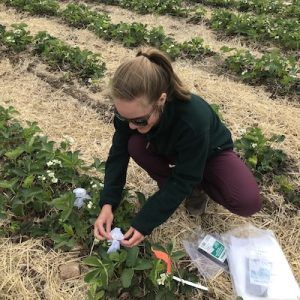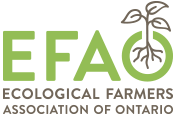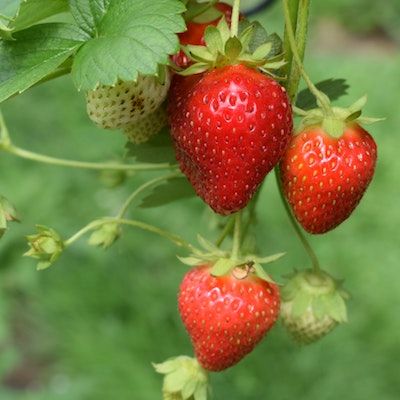2020 Bee Vectoring Project
Botrytis grey mold is ubiquitous in the environment and is one of the most economically important diseases of strawberries in Ontario. On conventional farms, grey mold is controlled via repeated use of chemical fungicides over the whole growing season. For ecological and organic farmers, controlling botrytis grey mold on strawberries can be challenging.
The 2020 Bee Vectoring Project, led by University of Guelph researcher Dr. Susan Chan and funded by the Seeding Food Innovation initiative of George Weston Ltd., is conducting trials in the 2021 season on field strawberries to determine the efficacy of the OMRI-listed biocontrol agent PreStop Mix (Gliocladium catenulatum) as a method to control grey mold in field strawberries using honey bees as vectors.
The benefits of using bees as vectors
- Application precision: Using honey bees as vectors permits continuous, precise application of the biocontrol agent to strawberry flowers (not leaves or the soil or the environment more generally) where Botrytis grey mold attacks the plant.
- Application efficiency: Using honey bees as vectors reduces the amount of biocontrol agent applied in comparison to applying the biocontrol agent by spraying, thus reducing costs to the grower.
- Pollination services: As bees deposit the biocontrol agent on the strawberry flowers, they also provide pollination service, increasing the quality of the berries. Because the biocontrol agent is a naturally occurring fungus itself, there are little to no negative impacts on the bees.
Information for Farmer-Cooperators
Grower requirements
- At least 2 varieties (early, late) of June-bearing strawberries with at least 3 rows of each variety;
- Preference for sites in central Ontario, if possible.
Research team responsibilities
- The project team will manage 2 rows of each variety during the flowering and fruiting season and most of the fruit in those rows will still be available to the grower.
- The project will provide honey bee hives, all equipment, and the biological control agent.
Contact
If you would like more information about the project or what’s involved in being a partner, please contact Dr. Susan Chan. Once a list of interested farms is established, Susan will host an online presentation and Q&A about the project. You can also follow the project on Facebook.

